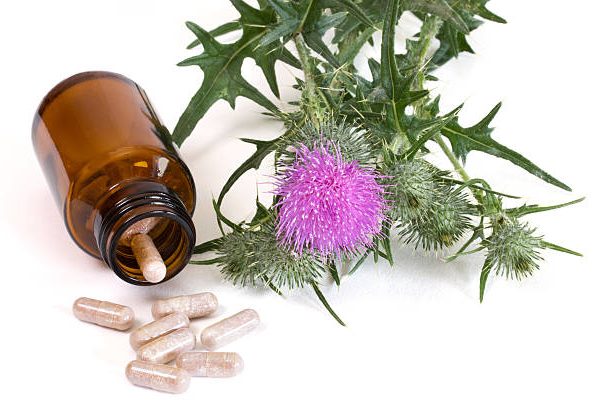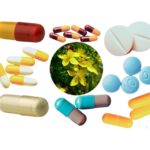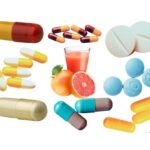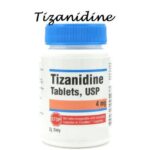50 Drugs That Can Interact With Milk Thistle

Milk thistle (Silybum marianum) is a herbaceous plant that has been used for centuries to treat various ailments. Its main active compound is silymarin, which is a mixture of flavonolignans with antioxidant and anti-inflammatory properties.
Milk thistle is primarily used as a natural remedy to support liver health and function, and is often used as a complementary therapy for liver diseases such as cirrhosis, hepatitis, and fatty liver disease. It is also sometimes used to help lower cholesterol levels and improve digestion.
Some studies have suggested that milk thistle may have other potential health benefits, such as reducing inflammation and oxidative stress, improving insulin resistance, and possibly even reducing the risk of certain types of cancer. However, more research is needed to confirm these effects.
Milk thistle is generally considered safe when taken in recommended doses, but it may cause side effects such as mild digestive upset or allergic reactions in some people. It is important to talk to your healthcare provider before taking any new supplement or herbal remedy, especially if you have a history of liver or gallbladder problems.
Can Milk thistle interact with your medications?
Yes, milk thistle can interact with some medications. It can affect the way your body processes certain drugs by interfering with the activity of certain enzymes in the liver that are involved in drug metabolism.
Milk thistle may increase the effects of drugs that are metabolized by the liver, leading to higher levels of the drug in the bloodstream and potentially causing side effects or toxicity. On the other hand, it may decrease the effectiveness of drugs that are also metabolized by the liver, reducing their therapeutic effects.
If you are taking any of these medications or any other prescription or over-the-counter drugs, it is important to talk to your healthcare provider before taking milk thistle or any other herbal supplement to avoid potential interactions or adverse effects. They can help you determine whether milk thistle is safe and appropriate for you to take based on your individual medical history and current medication regimen.
Here are 50 medications that may interact with milk thistle:
1. Acetaminophen (Tylenol)
2. Alprazolam (Xanax)
3. Amiodarone (Cordarone)
4. Amitriptyline (Elavil)
5. Amlodipine (Norvasc)
6. Aripiprazole (Abilify)
7. Atorvastatin (Lipitor)
8. Buspirone (Buspar)
9. Carbamazepine (Tegretol)
10. Citalopram (Celexa)
11. Clopidogrel (Plavix)
12. Cyclosporine (Neoral, Sandimmune)
13. Dextromethorphan (Robitussin DM)
14. Diazepam (Valium)
15. Digoxin (Lanoxin)
16. Diphenhydramine (Benadryl)
17. Disulfiram (Antabuse)
18. Escitalopram (Lexapro)
19. Fluconazole (Diflucan)
20. Fluoxetine (Prozac)
21. Fluvastatin (Lescol)
22. Furosemide (Lasix)
23. Gabapentin (Neurontin)
24. Haloperidol (Haldol)
25. Hydrochlorothiazide (Microzide)
26. Hydrocodone (Vicodin)
27. Imatinib (Gleevec)
28. Irbesartan (Avapro)
29. Lamotrigine (Lamictal)
30. Levothyroxine (Synthroid)
31. Lorazepam (Ativan)
32. Losartan (Cozaar)
33. Lovastatin (Mevacor)
34. Methadone (Dolophine)
35. Metoprolol (Lopressor)
36. Montelukast (Singulair)
37. Nefazodone (Serzone)
38. Omeprazole (Prilosec)
39. Oxycodone (OxyContin)
40. Pantoprazole (Protonix)
41. Paroxetine (Paxil)
42. Phenobarbital
43. Phenytoin (Dilantin)
44. Pioglitazone (Actos)
45. Pravastatin (Pravachol)
46. Quetiapine (Seroquel)
47. Rosuvastatin (Crestor)
48. Sertraline (Zoloft)
49. Simvastatin (Zocor)
50. Warfarin (Coumadin)
This list is not exhaustive, and there may be other medications that can interact with milk thistle. It is important to always check with your healthcare provider before taking any new medication or supplement, especially if you are already taking other medications.
How To Minimize The Risk of Interaction
Here are some tips to minimize the risk of interactions between milk thistle and your medications:
1. Talk to your healthcare provider: Before taking milk thistle or any other supplements, talk to your healthcare provider, especially if you are taking prescription medications or have a chronic medical condition.
2. Choose high-quality milk thistle supplements: Choose milk thistle supplements from reputable manufacturers that follow Good Manufacturing Practices (GMP) and have been third-party tested for quality and purity.
3. Follow recommended doses: Follow the recommended dosage on the product label and do not exceed it unless directed by your healthcare provider.
4. Take milk thistle separately from medications: To minimize the risk of interactions, take milk thistle supplements at least 2 hours before or after taking medications.
5. Monitor for side effects: Watch for any adverse effects when taking milk thistle, such as digestive upset, allergic reactions, or changes in blood sugar levels. If you experience any unusual symptoms, contact your healthcare provider immediately.
6. Keep a medication list: Keep a list of all the medications and supplements you are taking, including the doses and frequency, and share it with your healthcare provider and pharmacist.
7. Be aware of signs of potential interactions: Be aware of signs that may indicate a potential interaction, such as changes in the effectiveness or side effects of your medications.
Remember that interactions between milk thistle and medications are possible, but they can be minimized with careful use and monitoring. Always talk to your healthcare provider before starting any new supplement or medication to ensure that it is safe and appropriate for you.





